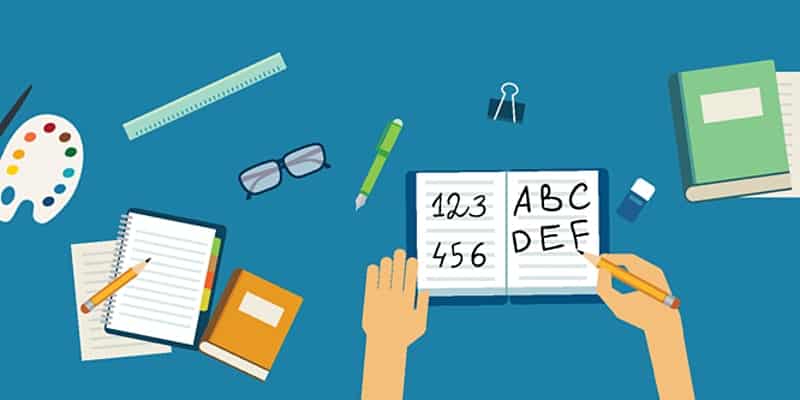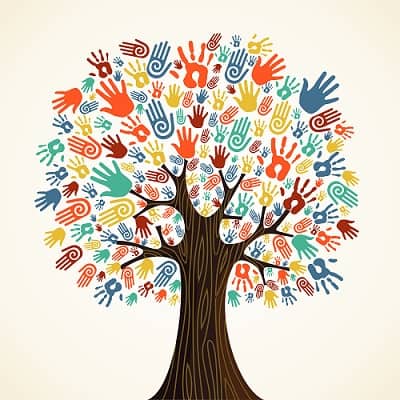NAEEA provides a webinar series to foster the exchange of ideas and support collaboration and cooperation across the sector. Many of the webinars are recorded and made available online.
Trauma Informed Teaching in Non Traditional Spaces: An Edited Collection
Trauma Informed Teaching in Non-Traditional Spaces: An Edited Collection is an emerging initiative, and is currently under construction. This webinar will share the SIGs research journey which focusses on mental health and enabling education, which has lead to this book’s creation.
The webinar focussed on key themes from the book such as: trauma informed practices, the importance of trauma awareness and pedagogy for educators in non-traditional spaces and to promote discussions on the holistic needs of students and educators.
Melting Moments in Math - A little warming of the cold heart of mathematics
With a passion for math and innovative thinking, enabling educator and co-coordinator of the NAEEA Math SIG, Deb Monteith, brings you Melting Moments in Math: a little warming of the cold heart of mathematics. This webinar will share how the NAEEA Math SIG is bringing creativity and curiosity to maths in enabling education, inspiring a numerate future.
Academic self-efficacy - A perspective in duality
Enabling educators view their programs as being much more than teaching students academic skills, such as readin’, writin’, and ‘rithmetic. While essential academic skills are a focus, the enhancement of students’ academic self-efficacy has been a key goal for many enabling programs. The approach taken to enhance academic self-efficacy is often not formally articulated in programs and is left up to the individual educator.
This presentation will address a number of issues around academic self-efficacy in enabling education programs, including:
- History of the definition of academic self-efficacy to ensure the group has a common understanding. A key here will be to demonstrate that the construct has not changed much over the years in terms of how it is understood;
- A summary of the proposed ways that academic self-efficacy is able to be enhanced in students;
- Examples of the student voice in relation to the role of enabling programs and the relative importance of academic self-efficacy in the program;
- How academic self-efficacy might be taught explicitly; and
- The role of the enabling educator’s belief system relating to enabling education and its students and how this supports the development of students’ academic self-efficacy, or otherwise.
This webinar was held in March 2025.
How to write a teaching award application: NAEEA Teaching Excellence Award
The NAEEA Executive Committee is very pleased to announce the inaugural NAEEA Teaching Excellence Award. To be eligible for this award, which celebrates and recognises excellent teaching within the Enabling subsector in Australia, nominees must be members of the National Association of Enabling Educators of Australia (NAEEA).
To support our NAEEA members, a webinar will be held by Dr Sarah Hattam titled: How to write a teaching award application
In this webinar, Dr Sarah Hattam (Australian Award for University Teaching (AAUT) winner, and national AAUT award assessor 2020-2024) will give you some tips and hints on how to approach building your NAEEA Teaching Excellence Award application. The webinar will address:
- How to build your own story of teaching excellence?
- How to connect your work to scholarship of teaching literature?
- What counts as ‘evidence’ of good practice?
- How to demonstrate impact of your work?
- How important is innovation in a teaching award application?
This webinar will be held on the 30th of August.
Defining and Delimiting Student Support: Insights and Challenges in Enhancing Support and Wellbeing for Educators and Students
Whether you are navigating student retention and success, enhancing mental health and wellbeing, promoting widening participation, refining pedagogical approaches, or shaping curriculum development, the concept of ‘student support’ invariably becomes integral to personal or institutional missions in education.
This webinar seeks to critically examine the term ‘student support,’ which has become ubiquitous and often lacks a clear definition. We delve into the insights from an autoethnography project conducted by the NAEEA’s Mental Health and Wellbeing Special Interest Group (SIG), where seven enabling practitioners from four universities reflect deeply on what it means to “support students” in their daily professional lives.
Aligned with the objectives of our SIG, this webinar places particular emphasis on supporting the mental health and wellbeing of enabling staff. These practitioners often face heightened risks of burnout due to the emotional demands and time pressures inherent in the neoliberal university environment, especially as they dedicate themselves to supporting students. Therefore, our discussion centers on the complexities and tensions practitioners encounter as they strive to fulfill their roles effectively amidst these challenges.
This webinar was held in July 2024
Approaches to teaching and engaging students from refugee backgrounds in Enabling Education
Students from refugee backgrounds (SfRBs) are entering Australian universities in increasing numbers, often via university pathway programs (enabling programs), often accessing them through university pathway programs, or enabling programs. Research has shown how higher education establishments have been slow to tailor support to the specific needs of SfRBs (Joyce et al., 2010; Lenette, 2016; Baker & Ramsey 2019) or improve their retention and progression in higher education (Kong et al., 2016; Molla, 2020).
This webinar will introduce you to culturally responsive pedagogies and how they complement enabling pedagogies. We will then share research findings from a UniSA College based project that explored best practice approaches for teaching students from refugee backgrounds in the enabling space. The findings are drawn from conversations with academics and refugee-background students.
In the second part of the workshop, we will explore trauma-informed pedagogies. We argue that the educational achievements of SfRBs can be enhanced when academic and peer support staff are responsive to the educational and socio-cultural experiences of students in the enabling spaces and the wider university.
This webinar was held in May 2024.
Towards a Critical Enabling Pedagogy – how collective action research has impacted teaching in Higher Education
This webinar will outline how collective action research has impacted on teaching across South Australia’s largest enabling program, and informed the development of a critical enabling pedagogy.
Critical enabling approach embraces diversity and student lifeworlds, sets challenging tasks, fosters belonging and is grounded in an ethic of care. It challenges a deficit view of students, and counters the traditional end of the HE pedagogical continuum which assumes a transmission approach (Fiore & Rosenquest, 2010). As student bodies become increasingly diverse in part due to the success of the Widening Participation agenda, critical enabling pedagogy provides an approach which both embraces and serves this diverse cohort, including those in undergraduate programs.
In this webinar we will present how two years of collective action research in one Australian university has transformed teaching practice and united a group of educators in their pedagogy, resulting in enhanced student outcomes, and the forthcoming release of an edited book on the lessons learned.
Date: TBC – Stay tuned!
Supporting students to meet learning outcomes: generative AI and assessment in enabling education
The primary purpose of assessment is to provide evidence that students are meeting learning outcomes by promoting student learning. Generative AI (genAI) tools such as ChatGPT have raised concerns about students using such tools to complete assessment tasks, potentially compromising the assurance that assessment tasks are providing an indication of student learning. At the same time, however, genAI presents educators with an opportunity to reflect on their assessment practices, and possibilities for preparing students in an age of genAI to understand and engage with these tools ethically and authentically.
Enabling the enablers: Professional development for peer leaders to enhance the learning experiences of enabling education students
This presentation from Dr Min Pham discusses the impact of a series of professional development workshops for peer leaders to enhance the student learning experience at an Australian enabling education institution over the period of four years (2019-2022). It discusses the impact of these workshops on peer leaders’ professional development and, more importantly, on enhancing the learning experience of students participating in Peer Assisted Study Sessions (PASS). The presentation also highlights the effect of this initiative on curricular and teaching practices.
This webinar was held in July 2023.
Increasing Access and Opporunity: Nesting Enabling Programs in Senior Schooling
Nationally, a persistent and significant link exists between socioeconomic status and university participation. Enabling programs play an important role in addressing such educational inequities, transitioning proportionally more students from equity groups to university than other pathways (Li, Carroll and Jackson, 2023).
A distinct and growing offering within the education landscape are enabling programs delivered within the senior years of secondary schooling, with diversity in approaches adopted by universities offerings such programs. With the University Accord focused on increasing access and opportunity, understanding the design and impact of these unique enabling programs is pertinent.
Hear from University of Southern Queensland and Edith Cowan University on the development of two school-based enabling programs, including successes, challenges and lessons learned.
This webinar was held in June 2023.
Teachers as Learners: Indigenising curriculum for enabling students
At the university of Tasmania (UTAS), the Unit Coordinators of UPP014 Writing in Practice set out to rewrite the curriculum to improve engagement, imbue cultural knowledges, and focus on critical reading and writing.
Adopting one of UTAS’s core values of a place-based education and applying it to strategy of indigenising the curriculum (Guerzoni & Walter, 2020), hower, we as Unit Coordinators faced several challenges in terms of our methodology. As non-Indigenous educators, we needed to revisit our own teaching philosophies and ensure proper process around consulting with key Indigenous knowledge-holders has been followed.
Hear from Rory Jeffs and Lisa Amerikanos as they share their journey of changing their pedagogical approach, taking a discomforting but necessary position of ‘vulnerable’ learners alongside students to achieve a more culturally sensitive curriculum.
The webinar was held in June 2023.
Educative culture of Academic Integrity: PD & initiatives at UniSA College
This presentation will explore the educative approaches to develop Academic Integrity in Higher Education. These approaches have been developed and deployed at the UniSA College. The practices, processes, initiatives and staff professional development around a culture of Academic Integrity will be shared.
The presenters, Dr Anthea Fudge, Tamra Ulpen and Dr Snjezana Bilic, were awarded the 2019 Australian Awards for University Teaching – Citation for Outstanding Contributions to Student Learning.
Watch the webinar recording on the NAEEA YouTube Channel.
This webinar was held in October 2021.
Research development & collaboration within Enabling Education
This is the first session of the Research Development and Collaboration (RDC) Special Interest Group (SIG) for 2021, which has been in recess due to COVID and the various significant impacts on Enabling Educators over this time.

This is an opportunity to get together and reconvene discussions about research development and research collaborations in the field.
Facilitated by Dr Anna Bennett (UoN) and Dr Jo Hanley (UoN) this event was held in September 2021.
The SCU 6-week teaching & learning model: students' & tutors' experiences
 Southern Cross University has introduced the 6-week model of learning and teaching. This NAEEA webinar will share some initial experiences.
Southern Cross University has introduced the 6-week model of learning and teaching. This NAEEA webinar will share some initial experiences.
Dr Suzi Syme and Dr Liz Goode present on key lessons learnt from staff and initial findings from student focus groups about their experience of the new teaching model.
Watch on demand on the NAEEA YouTube Channel.
This webinar was held in July 2021.
Yarning CIrcles: A richer learning experience

Yarning circles are an authentic Aboriginal pedagogy method. They facilitate a sense of belonging by providing a safe space to explore ideas and opinions, whilst building relationships between participants.
Watch on demand on the NAEEA YouTube Channel.
The webinar was held in May 2021.
Enabling Pedagogies for Cultural and Linguistic Diversity

Teaching and learning is experienced very differently by students from various culturally and linguistically diverse backgrounds (CALD).
Educators need to engage all students through relevant pedagogies. This webinar will discuss important ideas about engaging all students through appropriate pedagogies.
Watch on demand on the NAEEA YouTube Channel.
The webinar was held in April 2021.
The Aboriginal and Torres Strait Islander student and teacher experience through Covid-19
This webinar will discuss The Aboriginal and Torres Strait Islander student and teacher experience through covid-19. Discussion will focus around Indigenous pedagogies and the “8 ways of Indigenous learning”, and how these were adapted and changed to cater for an online learning environment.
Watch the webinar recording on the NAEEA YouTube Channel.
This event was held in October 2020.
Supporting Staff Mental Wellbeing in Enabling Education
In this webinar, we’ll identify some of the challenges we face as enabling educators (e.g. the emotional labour demands of our work; the accidental counsellor role) and share some strategies for supporting our mental wellbeing.
View this event on the NAEEA YouTube Channel.
The webinar was held in August 2020.


